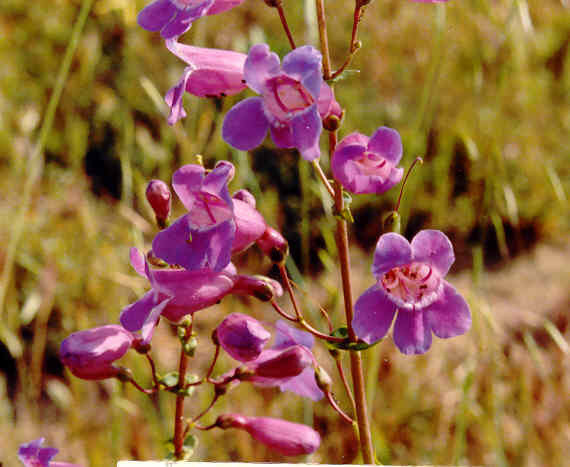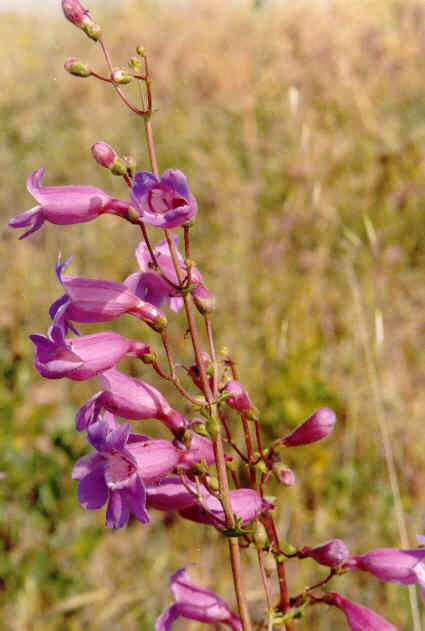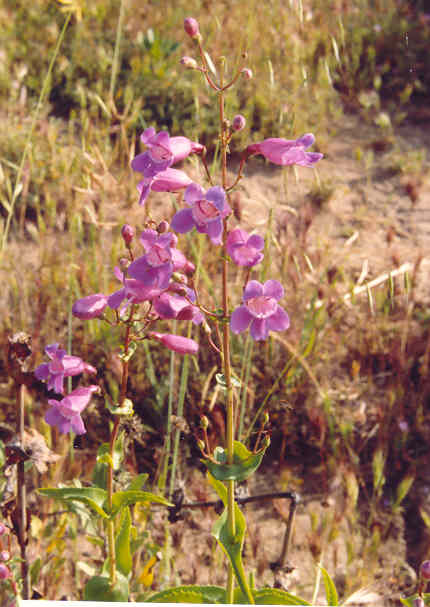
Penstemon species
 |
Penstemon species
Scrophulariaceae (Figwort Family)North AmericaPenstemon |
April Photo
Plant Characteristics:
Perennial, approximately 1 meter tall including inflorescence; lvs.
opposite, ovate-lanceolate, glaucous, glabrous, sessile, the upper connate at
base, strongly serrate, to 5.5 cm. long; infl.
paniculate, approx. 3.0 dm. long; fls.
2.5-3.5 cm. long on pedicels to 20 mm. long, rose-purple; corolla thinly
glandular-puberulent outside, tubular, the tube 8 mm. long, throat inflated,
limb 2-lipped, the upper lip 2-lobed and glandular-puberulent on the
inside, the lower 3-cleft with a few long hairs at the bases of the petals;
stamens 4, the upper two longer; anther-sacs opening lengthwise; filaments
glabrous; staminode bearded; calyx 5-parted, half the length of the corolla
tube. (description mine using notes
by John Johnson).
Habitat:
Escape from cultivation. Spring
bloomer. All Penstemons best in full sun.
Need fast drainage; many kinds best in loose gravelly soil with
infrequent watering. Usually
short-lived (3-4 years). (Sunset
Editors, New Western Garden Book 1984 p. 401).
Name:
Greek, Penste-mon, five stamens, the fifth being present, although
sterile. (Bailey 888).
General:
Rare in the study area, there being only a few plants growing adjacent to
the horse and bike path in Santa Ana Heights.
The plants were only here one year and failed to reappear the next. (my comment).
Spanish New Mexicans boil flowering tops and drink liquid for kidney
trouble. Indians made a wash and a poultice for running sores; also steeped tops
for colds. Red Penstemons were boiled and the solution used as a wash
for burns. It is said to stop pain
and help new skin to grow. (Sweet
56). About
250 species of perennial herbs or shrubs, native in N. Amer., Mex., and 1
species in N.E. Asia, furnishing many ornamental subjects.
(Bailey 888).
Munz, Flora So. Calif., lists 25 native species of Penstemon,
mostly of higher elevations.
The largest genus of flowering plants endemic to North America.
(Hickman, Ed. 1050).
Comparison of the gene sequences of various genes, usually those found in
the chloroplast of the plant cell has shown that plant evolutionary
relationships often differ from the classic anatomy and morphology
classifications of the past. Based
upon evidence obtained in studying the Scrophulariaceae, the genus Penstemon has
been moved to a new family Veronicaceae. (Olmstead,
Richard G. "Whatever Happened to the Scrophulariaceae?”
FREMONTIA, A Journal of the California Native Plant Society
Vol. 30 No. 2 April 2002 p.13-22).
All of the Scrophulariaceae found in upper Newport Bay will be moved to
other families as a result of genetic studies.
I have not done this as yet. (my comments).
Text Ref:
Bailey 888; Hickman, Ed. 1050; Munz, Flora So. Calif. 818; Sunset
Editors, New Western Garden Book 1984 p. 401.
Photo Ref:
April-May 92 # 12,13,14,15.
Genus identity: by R. De Ruff.
First Found: April 1992
Computer Ref: Plant Data 434.
Plant specimen donated to UC Riverside in 2004.
Last edit 8/8/05.
 |
 |
April Photo April Photo